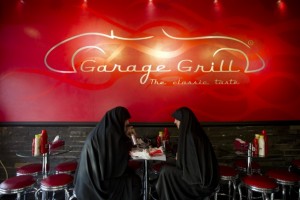 TEHRAN — At the Garage Grill in an upscale Tehran neighborhood, classic rock plays from the speakers, and photos of Paul Newman, James Dean and hot rods line the walls. It could be an old-time American diner, except that its hamburger prices reflect a wealthier target market here.Right next door, Dukkan Burger serves its fare on butcher paper, with plenty of Heinz ketchup and French’s mustard supplied on request. The clientele includes young women clutching designer purses, arriving with their dates in European luxury cars.
TEHRAN — At the Garage Grill in an upscale Tehran neighborhood, classic rock plays from the speakers, and photos of Paul Newman, James Dean and hot rods line the walls. It could be an old-time American diner, except that its hamburger prices reflect a wealthier target market here.Right next door, Dukkan Burger serves its fare on butcher paper, with plenty of Heinz ketchup and French’s mustard supplied on request. The clientele includes young women clutching designer purses, arriving with their dates in European luxury cars.
Greasy burger joints have been part of Tehran’s fast-food landscape for decades, even in the years just after the 1979 Islamic revolution, when any symbol of U.S. culture was denounced as an example of “Westoxification.” Those eateries were mostly in downtown working-class neighborhoods, serving laborers in need of a blast of calories or students watching their budgets.Now, though, high-end burger restaurants are suddenly popping up across the city, making the gut-busting American institution — and the quest for the best burger — the latest trend in Tehran dining.Facebook pages dedicated to local hamburger outlets debate their relative merits, comparing them to McDonald’s, In-N-Out, Burger King and other U.S. chains. That fascination with brands has resulted in such blatant rip-offs as McAli’s, Superstar — conspicuously similar in appearance to Carl’s Jr. — and even a place calling itself Five Guys.
After a string of restaurants catering to Tehran’s rich opened and closed in recent years, observers of the capital’s culinary scene say the rise of the quality burger is not surprising, especially given Iranians’ love of grilled meat.
“Burgers are very simple. It’s a promise that’s to easy deliver on,” said Payam Kashani-Nejad, the founder of Gumboo Guide, a Web site devoted to reviews of Tehran restaurants. “And it’s a big market.”
David Yaghoobi, until recently creative director at a top Iranian advertising agency and now based in London, noted that the burger, while well-known here, is still somewhat exotic, boosting its appeal.
“In Iran, most things foreign are considered high-end, and as a burger is considered foreign, maybe there is some of that, too,” he said.
It is no coincidence, then, that most of the new hamburger restaurants are in the affluent neighborhoods of northern Tehran, in the foothills of the snowcapped Alborz Mountains — places like Niavaran, where Garage Grill and Dukkan could dare to open side by side.
“Our concept is purely American,” said Arash Farhadpour-Shirazi, co-owner of Garage Grill. “Burgers and cars.”
The young male servers at Garage Grill wear T-shirts from a classic-car rally that the restaurant sponsored last year. A neon Route 66 sign hangs in the front door above the back half of a classic Austin Mini. The car’s front half and the front of an orange BMW 2002 double as the restaurant’s grills.
“It’s a short escape into a different environment,” Farhadpour-Shirazi said. “Iranians love the American style. The grass is greener in the U.S.”
In nearby Farmanieh, the most popular of Tehran’s new burger joints, Burgerland, was opened last year by the members of the Iranian underground band Barobax.
In 2010, Barobax produced the biggest domestic music hit in recent memory, the wedding staple “Soosan Khanoom.” But the group members say they started Burgerland because there is more money in the food business than in music.
Fans line up to take photos with them, but they deny that is the main reason Burgerland is perpetually packed.
“Maybe the first and second time people come it’s to see us, but if they didn’t like the food, they wouldn’t come again and again,” said Khashayar Moradi Haghgoo, who owns and runs the restaurant with his bandmates and cousins, Keivan Moradi Haghgoo and Hamid Forouzmand. Moradi reported that Burgerland routinely sells 1,500 hamburgers a day, more than three times the output of most eateries described here.
Across town in the western neighborhood of Shahrak-e Gharb, BurgerHouse sees itself as the pioneer of Tehran’s hamburger craze. In business for three years, owner Amir Javadi said no one else was selling quality burgers in the city when he opened, and then “this year, all of a sudden, burger joints started sprouting like mushrooms.”
BurgerHouse started as strictly takeout and delivery but accidentally became Tehran’s lone drive-in restaurant.
“We noticed that people would pick up their orders and then just sit in their cars and eat,” Javadi said. “There are extra costs for delivery, like the packaging, so we started giving the option of bringing trays to customers’ cars, and people got used to it.”
Every night, even during the freezing winter, the narrow street that is home to BurgerHouse is lined with cars of regulars waiting for their order numbers to appear on a screen above the tiny shop front.
To Javadi, the success of burgers in Tehran is unconnected to any particular cultural trends or preferences beyond the simple pleasures of the food itself.
“No one looks at a burger as something American or even foreign anymore,” Javadi said. “It’s one of the world’s favorite foods.”
By The Washington Post
The Iran Project is not responsible for the content of quoted articles.

 QR code
QR code